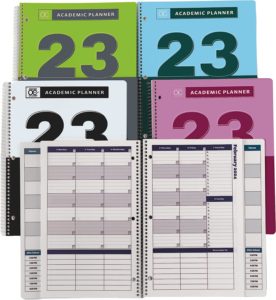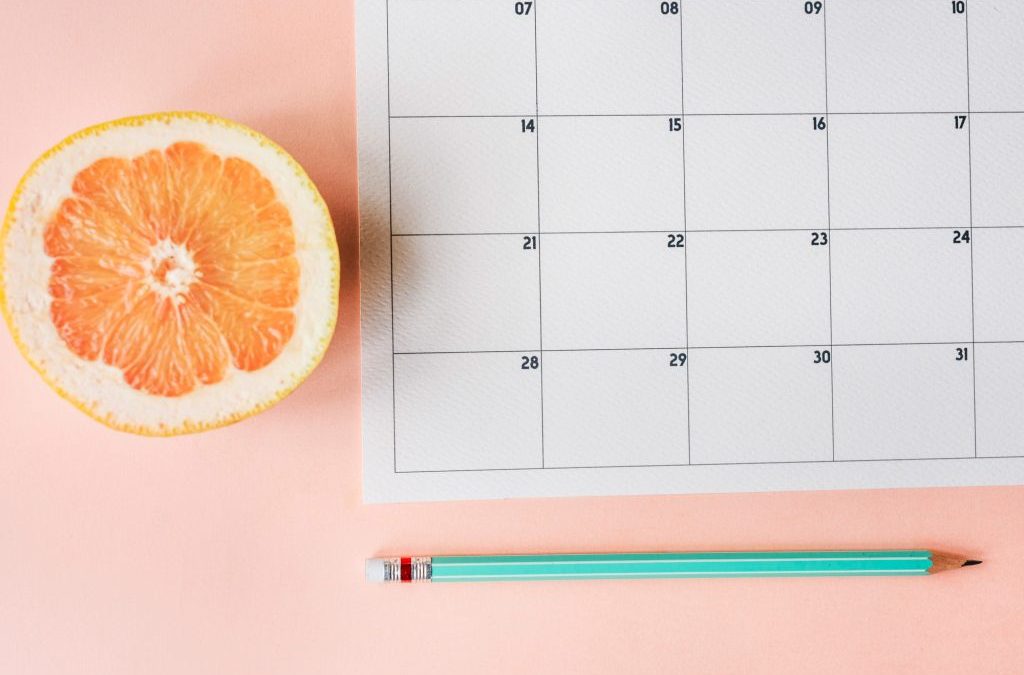With many of our students, one of the first things we work on is finding a planner system that works for them, and using it to record all of their assignments — including daily homework, study plans, and milestones for long-term projects and papers.
Why is this so important?
In addition to improving time management, there are a number of psychological reasons why planners help with memory and focus.
1. Writing tasks down makes it easier to remember them
Writing and listening utilize different areas of the brain – so when both are activated simultaneously, memory is enhanced. What does this mean for students? When they write their homework down when it’s announced in class, they are far more likely to remember it. Not to mention that it also gives them a written reminder they can refer back to, just in case their memory is not 100% accurate.
2. Having a written plan frees up working memory, which makes it easier to focus on the task at hand.
Unfinished tasks occupy your attention and make it more difficult for your brain to focus on the task you’re currently working on. (this is called the ‘Zeigarnik Effect’.) When students record all of their assignments and planned activities in a planner, their brains can stop struggling to keep track of everything they have left to work on, and focus fully on the task at hand. Just like freeing up RAM on a computer, this enables students to pay closer attention, learn more effectively, and complete their work more quickly.
3. Written plans act as an external memory ‘cue’ and enable long-term planning
The closer students get to college, the more important it is for them to be able to keep track of deadlines and submit assignments on time with few — if any — reminders from parents or teachers. In college, professors may assign a long term project at the start of the semester and expect students to work on it over the course of several weeks or months with few intermediate deadlines.
Students often assume that they will remember upcoming due dates and projects without having to record them. But memories tend to be triggered by physical cues, not dates or times, so you can’t rely on your brain to remind on March 22 that you need to start studying for your test on March 25…unless there is an external cue in your environment (like a note in your planner!) to serve as a reminder.
4. DUE dates versus DO dates
The biggest mistake we see students making with planners is using them only as agendas that mark their due dates. While being aware of due dates is essential, students should also be using their planners to PLAN their DO dates!
This is why we’re intentional about using the word ‘planner’ as opposed to ‘agenda.’ Ideally, if a student is using a planner effectively, they’ll look at each of their upcoming due dates, and create a plan for what they want to work on when in order to complete their work before the due date. For example, if they know they have a Political Science test on Friday, and an English paper due on Thursday, they can map out what they want to do each day between now and then to complete the work on time.
When students have only a few classes, relatively simple assignments, and work that is due 1-2 days after it’s assigned, they can usually get along OK without a planner — especially when they have parents or teachers who are very organized and are acting as their external reminder system. But in the long term, students need to have a way to keep track of assignments and due dates on their own, set intermediate deadlines for long-term projects, and create external reminder systems to keep themselves on track. A planner is a great way to do this.
There are a number of different planners that can work well for students.

Our favorites are planners like the one pictured above (from Order Out of Chaos), which have the days of the week listed horizontally, and their classes listed vertically so students can see their entire week in one glance and easily see exactly how much time they have left to prepare for each major due date.
And because there is also space to enter after-school activities and weekend commitments, students can plan ahead more intelligently by also taking into account other commitments that might affect the amount of time they have available to do homework on any given day.
For students who struggle to keep track of paper planners, or find the process of writing things down to be too difficult or time-consuming to keep up with, online calendars and planners like Google Calendar, MyHomework, or iStudiez can work well, especially if students are allowed to use their phones in class and have a good way to turn off distracting messages & notifications during homework time. Students can also set up simple planner templates in Google Docs and Google Sheets if they don’t want to use a separate app.
Whether they choose a paper or electronic calendar, the MOST important thing is to find a planner that your student enjoys and is willing to use.
Is your student using a planner regularly?
If not, it may be worth having a conversation about this topic to find out more about their current method of managing deadlines, and their ideas about using a planner. It may be that they dislike their school planner, but would be open to trying a different one or managing deadlines through a task manager on their phone.
Getting more support
If you’ve talked with your student before about using a planner and they weren’t open to your advice or suggestions, another possibility is to get some outside support. If you’d like to talk with us about your student’s situation and how academic coaching might help, you can sign up for a complimentary consultation by clicking here.

Join 11,000+ parents helping their students earn better grades with less stress!

About The Author
Dr. Maggie Wray is a certified ADHD Coach & Academic Life Coach with a Ph.D. in Neurobiology and Behavior from Cornell and a Bachelor’s degree in Astrophysics from Princeton. She founded Creating Positive Futures in 2012 to help high school and college students learn how to earn better grades with less stress. Her team of dedicated coaches is on a mission to empower students to develop the mindset, organization, time management, and study skills they need to achieve their goals.
Related Posts
Other Posts You May Enjoy
Optimistic students earn better grades
Is your student more of an optimist, or a pessimist? Studies have shown that optimists experience a number of benefits later in life, as compared with their more pessimistic peers, including… Better test scores and higher GPAs Lower levels of stress, anxiety, and...
Starting before you’re motivated
Most students want to do well in school. But wanting to do well doesn't guarantee they will feel motivated to work on assignments in the moment. Even students who usually get good grades have days when they just don’t feel like doing homework or studying for their...
Kids Want to Do Well!
"They know what they need to do.I’ve reminded them 10 times already.This isn’t that hard.Why aren't they doing it?Do they just not care?" We talk to parents all the time who are worried that their kids just don’t seem to care about doing well, because they’re not...




